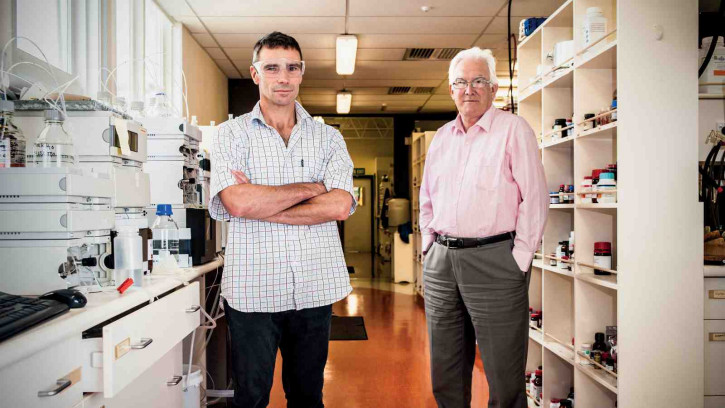This vaccine is expected to create protection against malaria for more than 50 percent of people vaccinated—compared with the currently available vaccine which only offers long-term protection against infection for up to 30 percent of those immunised.

Dr Gavin Painter (left) and Professor Richard Furneaux at the Ferrier Research Institute.
Malaria kills around half a million people a year, disproportionately affecting children in developing countries. The disease is caused by a parasite that is transmitted to humans through the bite of infected female Anopheles mosquitoes. The parasite then travels to the liver, where it replicates for about 10 days before re-entering the bloodstream, causing the disease to take hold.
Traditional malaria vaccines typically work by looking for foreign bodies or antigens present on the surface of the pathogen. While these ‘antibody-producing’ vaccines can be incredibly potent and offer long-term immunity, they don’t work as well against malaria—protecting only around 30 percent of those immunised—because the parasite resides inside cells that antibodies can’t reach.
Victoria University of Wellington’s Ferrier Research Institute has been working with the Malaghan Institute for Medical Research, the University of Melbourne, and Avalia Immunotherapies—a Wellington UniVentures spinout—over the past three years to design and develop a simpler, more effective vaccine that targets the liver.
The aim of the project is to develop a fully synthetic, self-adjuvanting vaccine that produces high numbers of the liver’s memory T cells to create stronger immunity and greater protection against malaria.
Wellington UniVentures has been involved since the technology was first disclosed, advising on and managing all aspects of the intellectual property involved, and generally supporting this collaboration.
Features and benefits
Greater protection
Novel design
The ability to target specific tissues like the liver represents a fundamentally new way to think about vaccine design.
Easily scalable
Because it is synthetic, the vaccine could be efficiently manufactured on a large scale and administered easily in at-risk countries.
Next steps
While the vaccine is still at an early experimental stage, the work has been published in the Science Immunology journal by co-lead authors Professors William Heath and Gavin Painter. Professor Heath, from the University of Melbourne, is a world leading scientist in malaria and liver tissue-resident memory T cells; Professor Painter is from Victoria University of Wellington’s Ferrier Research Institute, and is also Chief Technology Officer for Avalia Immunotherapies.
Professor Painter was recently awarded a grant from the Health Research Council of New Zealand which he is using to pre-clinically explore epitopes—the small fragments of novel malaria parasite antigens that can be recognised by the immune system, and therefore targeted with a vaccine.
Next steps involve evaluating vaccine candidates in preclinical models of malaria disease so that a lead candidate can be identified.
A Phase I clinical trial is currently targeted for 2023, following planned safety studies and vaccine candidate manufacturing.
Avalia Immunotherapies is looking to partner with organisations and companies that are interested in developing new malaria vaccines—or enhancing existing solutions that could be strengthened by promoting the formation of liver-resident memory T cells.
For more information, please contact the Commercialisation Manager below.

